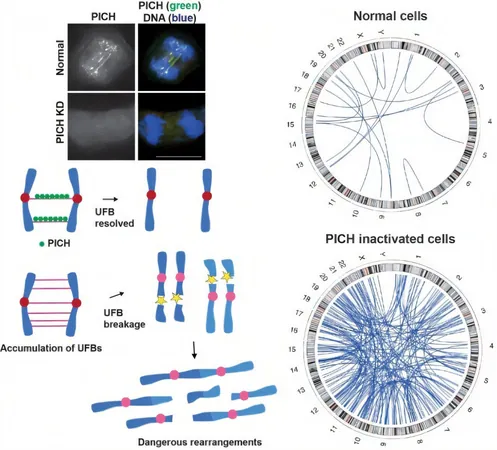
Breakthrough Discovery: PICH Protein Could Be The Answer to Combating Cancer!
2025-01-21
Author: Jia
Breakthrough Discovery: PICH Protein Could Be The Answer to Combating Cancer!
Researchers from The University of Hong Kong (HKU) have unveiled a groundbreaking discovery that could change the way we approach cancer treatment. A team led by Professors Gary Ying Wai Chan and Ken Hoi Tang Ma has identified a crucial protein known as PICH, which plays a pivotal role in protecting our DNA during the critical phase of cell division. This research not only sheds light on the mechanisms behind genetic stability but also opens up new avenues for fighting cancer.
Published in the prestigious journal *Nucleic Acids Research*, this study emphasizes the importance of genetic integrity, particularly in the context of cancer-causing genetic errors. Every time a cell divides, it faces the risk of forming ultrafine anaphase bridges (UFBs) – tiny, thread-like structures that can cause catastrophic problems if they aren't resolved correctly. Think of these UFBs as silent saboteurs that can disrupt the delicate balance of our genetic information.
The HKU researchers found that PICH acts as a critical surveillance mechanism, akin to a radar system that detects these UFBs before they wreak havoc. When PICH is malfunctioning or completely absent, it can lead to dire consequences: cells suffer extensive DNA damage, which in turn triggers emergency responses that may even lead to cell death. Beyond this, the disruption can result in dangerous chromosomal rearrangements—often characteristic of cancer cells.
The team's findings indicate that PICH facilitates two vital processes to maintain genetic stability. Firstly, it assists another protein, topoisomerase IIα (TOP2A), in resolving tangled DNA threads. Secondly, PICH collaborates with BLM helicase to transform these chaotic threads into a manageable form. This two-pronged approach ensures that our DNA remains intact during the potentially perilous process of cell division.
Professor Gary Ying Wai Chan highlighted the clinical implications of their research, stating, "Our work underscores the significance of PICH in safeguarding our DNA from damage during cell division. Understanding its function could lead us to new treatments for cancers linked to chromosomal instability, such as colorectal, gastric, and breast cancer."
Furthermore, the researchers employed next-generation sequencing (NGS) to uncover genetic mutations in cells lacking PICH, showcasing the effectiveness of this state-of-the-art technology in detecting genomic instability. This collaborative effort emphasizes the power of teamwork in science and the importance of combining expertise to yield significant findings.
In summary, the discovery of the PICH protein's role in maintaining genetic stability represents a significant leap forward in our understanding of cancer biology. By targeting the pathways associated with PICH, scientists could develop innovative therapies aimed at preventing or treating various forms of cancer. This exciting research lays the groundwork for future studies that could revolutionize cancer treatment and ultimately save countless lives.
Stay tuned as we continue to follow this groundbreaking research and explore what it means for the future of cancer therapies!


 Brasil (PT)
Brasil (PT)
 Canada (EN)
Canada (EN)
 Chile (ES)
Chile (ES)
 Česko (CS)
Česko (CS)
 대한민국 (KO)
대한민국 (KO)
 España (ES)
España (ES)
 France (FR)
France (FR)
 Hong Kong (EN)
Hong Kong (EN)
 Italia (IT)
Italia (IT)
 日本 (JA)
日本 (JA)
 Magyarország (HU)
Magyarország (HU)
 Norge (NO)
Norge (NO)
 Polska (PL)
Polska (PL)
 Schweiz (DE)
Schweiz (DE)
 Singapore (EN)
Singapore (EN)
 Sverige (SV)
Sverige (SV)
 Suomi (FI)
Suomi (FI)
 Türkiye (TR)
Türkiye (TR)
 الإمارات العربية المتحدة (AR)
الإمارات العربية المتحدة (AR)